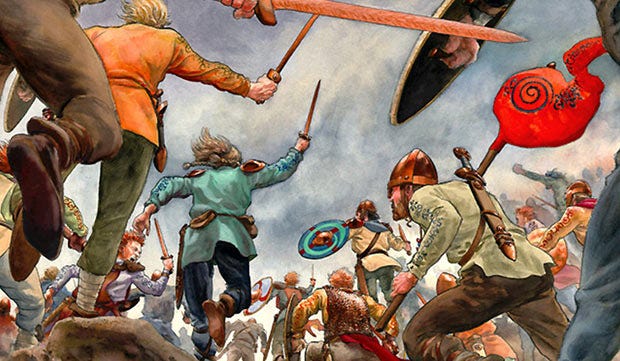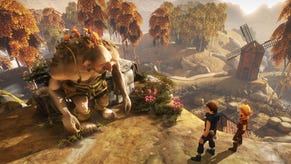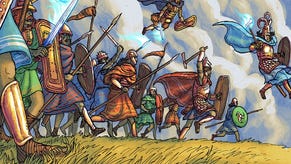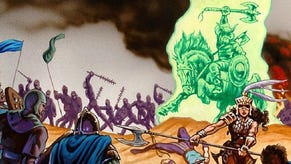Wot I Think: King Of Dragon Pass
A Sharp and HeroCraft's King of Dragon Pass [official site] is perhaps best described as a management game presented like a choose-your-own-adventure book, but that would be to profoundly undersell it. A new version arrived on Steam last week: is it still as good as the legends tell?
King of Dragon Pass is the best game you’ve never played. Unless you have played it, in which case you’d probably agree that it’s one of the best games you’ve ever played. First released on PC in 1999, it was recently overhauled for mobile, and that new version has now returned home. Despite some unfortunate technological corner-cutting, it’s become more essential than ever.
In the past, I’ve used the phrase “the nexus of all PC gaming” to describe the original X-COM’s deft blend of strategy, roleplaying, tension and storytelling, but maybe that salute is better applied to King of Dragon Pass. So much is fed into it, so many games feed from it. From the agonising weighing of morality against practicality that we see in Bioware-style RPGs to the careful balancing act of statistics familiar from RTSes and roguelikes, this is a grand and beautiful tapestry of concepts. It can’t be approached lightly, it requires study as well as roleplaying indulgence and it can spin off into more directions than you may be able to keep track of. That’s what makes it so satisfying, so compelling, and so fiendish.
You’re in charge of a once-mighty but now down-on-its-luck tribe who settle in the dangerous Dragon Pass, and their well-being is your enduring concern. Food must be provided, farmers and fighters’ needs must be met, trading with other tribes is vital, as is either brokering peace with rivals or crushing them under your heel. Men and monsters alike will bedevil your efforts, while various gods must be placated in order to gain new knowledge and secure healthy harvests. All of this management happens with clicky buttons and simple sliders; characters are usually named rather than shown, and interactions are chosen from lists of text. There's loads going on, and the game doesn't exactly go out of its way to help you keep track of it all.
What seems at first like juggling 99 dodecahedronal balls soon becomes clear but acute concerns, often directed by pop-up events, your response to which can mean crisis or reward, or something in between. “There are no right answers” is perhaps KODP’s mantra, but nonetheless there are so very many wrong answers. As in Game Of Thrones, characters’ fates can turn on a sentence, or a character's unknown whim. Approach a rival leader in a way which offends them and you might find yourself at war. Choose poorly in your re-enactment of a myth and one of your tribe’s leaders might be slain by a god. Refuse to indulge a visiting troll’s seemingly pointless request for single combat and you’ll suffer regular skirmishes from hundreds of them, their having become convinced that you’re weak and cowardly easy prey.
Decisions, decisions, countless decisions. It’s enormously stressful. There are butterfly effect consequences to everything: some wrapped up relatively quickly, others haunting you for years. What about that mystic item you agreed to look after for passing nomads? Other groups kept asking for it, and eventually you traded it away for another trinket, afraid there’d be war if you said no. There will be a reckoning when the nomads return: but when? How severe will the repercussions be?
Games such as FTL, with their moment-to-moment, rather mechanical disasters, end up feeling so small by comparison. Bioware-style RPGs seem so hand-wringing, so focused on Good or Bad and what that means, rather than the infinitely more complex business of keeping a community safe. There may be magic and monsters here, but most of all it’s politics, and the horrible compromises and exploitation governance always seems to involve. The dynastic sweep of Crusader Kings and the slow-burn choose-your-own-attrition of The Banner Saga are probably the best touchstones, both thematically and in terms of what your primary concerns are. But it’s X-COM I come back to when I think about KODP, in terms of mood and feel. The ceaseless worry, the sense of the world’s dangers escalating faster than you can keep up with, the crushing weight of responsibility for other people’s lives and well-being, that dread feeling as you watch the numbers go down. Your warriors, your food, your wealth, your allies: so vital, so easily lost.
The only combat there is KODP in is auto-resolved and, like everything else in the game, purely shown as a screen of text and numbers with a single, static illustration. Somehow this feels no less involved than an X-COM mission, as you stare at the statistics, agonise between a couple of options about who to send where or what overall strategy your guys should take, searching for something that might tip the odds, praying that fate will be kind even when the situation is clearly desperate.
Fate does play a big part in KODP’s almost unbearably tense proceedings, but a spine of concrete strategy runs through it. To win, you’ll need practice and research, learning from your past failures and paying close attention to the many screens and paragraphs of mythology unlocked as you commune with this world’s many gods. Certain scenarios are prophesied, while the difficult Heroquests which unlock major bonuses and new story beats require ritualistic precision to complete.
The great disappointment of this new version of KODP is that it lacks the facility to have multiple windows open or a built-in note-taking system, to ease the blow-by-blow reference to these unwieldy myths that's necessary to beat the Heroquests.
On the other hand, this forces you to take a more painstaking approach, taking manual notes or working hard to memorise and repeat ancient tales: unknowingly recreating the very roots of human storytelling as well as adding a certain sense of investigation. Perhaps there one day will be another new version of KODP, with wiki links and an annotation system built-in, and it will be interesting to see whether this elevates or undermines the game. For now, there are cheaty methods if you so wish, such as copying the URL of the myth page which clunkily loads in a Steam browser window, then pasting it into a tab to refer back to later. It’s a side-effect of a rudimentary port back from mobile: you could only close those screens on iPad, but this too clearly demonstrates that so much of what powers the game is a series of offline webpages.
Seeing how the sausage gets made does mildly disrupt what is otherwise a phenomenal exercise in world-building. KODP’s mythology and lore seems so fully-formed and self-contained compared to most any RPG, its elaborate, careful tales of ancient gods seeming to be as long-held and passed down the ages as our tales of Norse or Egyptian deities today.
Some of the wider presentation is far too rudimentary too, at least in terms of creating a barrier to entry for the wary. Buttons and sliders are ugly, typography is perfunctory, so much information gets awkwardly crammed into small spaces, there are no tooltips, some screens involve an inordinate amount of scrolling but have no mouse-wheel support, and a text-selection interface designed for touch occasionally yields an incorrect option with a mouse.
Again though, these are barriers not deal-breakers: the point here is to lose yourself in another place with a raft of new concerns, your interest not in flashiness but in management. Were King of Dragon Pass more mercenary, it could call itself Fantasy Village Manager and get away with it. However, that would undersell its determination to avoid both trope and mawkishness. This is not a game you can second-guess, nor one which ever emotionally blackmails you into doing the right thing.
King of Dragon Pass might look simplistic and even a little cheesy, but it is enormous, smart and fiendish. Choose your own adventure writ at the grandest scale, and a chance to tell your own history, not a mere legend. While the 'new' version is only a baby step towards technological contemporariness and cuts far too many corners on PC, it is nonetheless a more accessible improvement over its 90s ancestor, and most of all it's a very good excuse to embark upon one of the most rewarding, compelling and tragedy-strewn adventures you'll ever have.
The 2015 version of King Of Dragon Pass is out on Steam now, or the cheaper 1999 version is available on GOG.





















